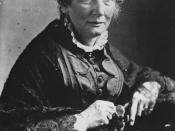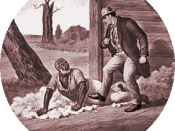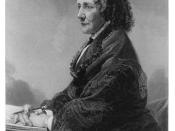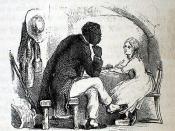I read Uncle Tom's Cabin by Harriet Beecher Stowe. The story is about a slave named Tom in Kentucky who gets sold in New Orleans to two new masters. It relates the trials and hardships that Tom goes through being away from his family. It also covers the escape of Eliza, who is trying to keep her young son from being sold along with Tom, and how their undying faith in God helped them to get through it all.
Tom was a tall and powerfully built black man, with "truly African features", which externally revealed his kindness, humbleness, benevolence, and holiness (26).
Tom was extremely well-liked among the other slaves, and was admired for his amazing ability to pray straight from his pure heart and lead them in their worship (35). He possessed a rare faith in God, and resolved to let nothing harm him on earth, because God would always do what had to be done.
This faith is expressed as Tom states, "The Lord's will be done," when he found out he was to be sold when his second master died (350).
He showed obedience to God's commandments to the point where his life could have been taken when he refused to beat another slave (386). When others were suffering, he would give up his own comforts for them, such as blankets, or food, or his own picked cotton, risking himself rather than the helpless (427). He was a faithful servant, regardless of the cruelty of his master, always obedient and submissive (38).
The major conflict was with Tom and how he was sold. He went from a kind master who treated his slaves like part of the family, to the next who was somewhat similar but seemed to pamper them, to a cruel despot who enjoyed punishing those who didn't work accordingly. The problems began with the last, who was named Legree.
Legree had a certain fear of Tom because of his unconquerable faith in Christ (426). He taunted him when Tom was going through a spiritual crisis, when his soul was so low that he was beginning to lose hope. He felt only despair and wonder that God could place him in such a horrible situation, and, being surrounded by others who saw only darkness in this world and the world to come, began to doubt his beliefs (422). This was the first conflict, but after Legree stabs him in his heart with a certainty in Tom's loss of faith, he has a vision of Jesus, saying, "He that overcometh shall sit down with me on my throne, even as I also overcame, and am set down with my Father on his throne" (423).
This inspired Tom to regain his faith and make the best of his situation. But Tom is terribly abused by Legree, physically as well as mentally, and when he refuses to tell what he knows concerning two runaway slaves, he receives a severe beating (447). The final resolution is that what he's been awaiting finally arrives, and he goes to be with Christ in the kingdom, in his true home (453).
The theme of the novel is that you can lose everything in the world, but God will always be there, and therefore you'll never lose the most important thing. Tom was taken from his family, and first from one master he loved, and then from a second, and Then placed in an atmosphere that stripped him of any privileges or leisure he might have had previously. That place almost took his faith out of his heart, but he held on: "Though parted from all his soul held dear, and though often yearning for what lay beyond, still was he never positively and consciously miserable" (280). Tom was exposed to several situations in which so many of us would find it easier to pity ourselves and grow weak, to just give up, rather than staying strong and willful. He found peace wherever he was and in whatever he was going through. When Legree tried to rob him of his faith and make him a cruel overseer, Tom said, "I shall have help; you'll never do it" (412). The author is trying to get across to us the importance of always trusting in God, and that what we think may be hard times could be so much worse. And when they are worse, the Lord will still be there, and will still help us to survive it.
I strongly agree with Stowe in that we should stand fast next to God at all times.
It's important that we never lose our faith and we hold on to it with all our strength, because God's love for us is unconditional, and because after everything we may have is gone, that is the one thing that can always help us.





